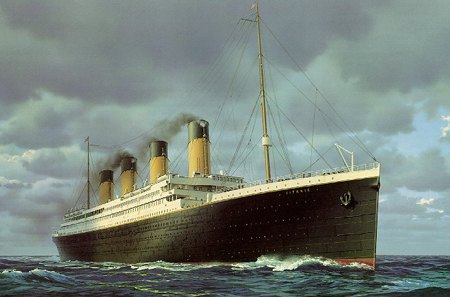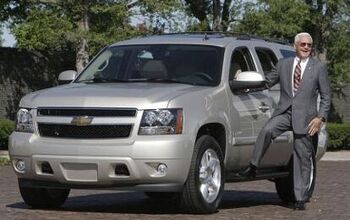General Motors Death Watch 146: The UAW Strikes Again
After more than a week of overtime negotiations, the United Auto Workers (UAW) is on strike at General Motors. For those who think this action signals the beginning of the end for The General: yes and no. On the yes side, the strike will highlight the original sins that led both sides to this point. The executive greed and mismanagement. The union intransigence and denial. The strike will alert the dim-witted media that the Emperor hasn’t been wearing any clothes for decades, ding GM's rep, and make it even more difficult for the carmaker to sell cars. On the no side, GM will settle. A compromise will be reached. The same players will resume the game, poorer but no wiser.
The strike stems from one simple fact: the UAW is unwilling to take a hit for the team. As I’ve stated many times, trade unions are not in the business of surrendering wages, benefits or working conditions. It’s not in their nature. All the previous UAW “givebacks”– which supposedly signaled the union’s willingness to sacrifice for the good of the company– were nothing of the sort. They were payoffs. You want us to give up jobs? Create an attrition program. You want to increase our health care co-pays? Stick $2b in the bank. The UAW puts the “pro” in quid pro quo.
Can you really blame the UAW for holding fast to this "you'll get what you pay for" philosophy? Sure, analysts and media pundits have been bleating on about the need for GM to trim its labor costs to keep pace with their non-union competition. But how can a union member be expected to make a sacrifice when the company’s top players are paying themselves tens of millions of dollars in salary and bonuses? Do as I say, not as I do? I don’t think so.
GM went into these negotiations determined to create a $51b union-administered VEBA health care superfund. As always, the UAW was listening to WIIFM (What’s In It For Me?). You want to dump your health care liabilities on us? Show me the money. Not 65 cents on a dollar. Not 50 percent stock, 50 percent cash. A $51b health care VEBA will cost you… $51b. And while we’re at it, let’s have some job guarantees and a nice fat signing bonus.
The fact that GM didn’t give the union what it wanted has nothing to do with testicular fortitude. If GM had the money to cut the deal, they would have cut the deal. But they don’t, so they didn’t. Ten or twenty years ago, GM could have written a check or, at the least, rung-up a few bankers and arranged favorable financing. No more. Cash-wise, Forbes says they're sitting on $32b. Take off a $10b float, add up their ongoing liabilities, consider the cost of borrowing $51b and it's no wonder the VEBA was a stock-heavy deal. Or that the union walked.
Which leaves us here: either GM will borrow the “extra” money at usurious rates to establish their beloved VEBA and settle the strike, or they’ll dump the VEBA and settle the strike with a new wage structure and working conditions. That's provided GM has the money to pay off the union for these “givebacks.” If GM can't pay the freight for ANY changes in the UAW's wages, benefits or working rules, they’ve either got to keep on paying the current rate plus a little bit ‘mo (‘cause there’s always a little bit ‘mo) or go nuclear: sit it out, file chapter 11 and hit reset.
Again, in all likelihood, GM will cave. Just as the UAW never surrenders, GM never stares them down. Meanwhile, the UAW strike is pouring gas on GM's cash conflagration. The UAW's 53-day, 9200 worker strike against GM in 1998 cost the automaker an estimated $2b or roughly $37m a day. This time 'round, 73k UAW members are on strike. This industrial action could cost GM as much as $300m per day. At that rate, GM's entire cash pile would be gone in 106 days. What's more, if GM is too cash-strapped to buy off the union now, what hope will there be in a month or more?
At the same time, the more GM publicly justifies its negotiating position– we can't keep up with the Toyotas of the world with our sky-high UAW labor costs– the more people will hear "GM can't compete." And that story renders GM's PR narrative– our house is now in order and we're on the cusp of a major product-led renaissance– meaningless. In fact, with each passing day of this strike, GM will look more and more like what it is: an old-fashioned, incompetent, easily-distracted automaker caught flat-footed by its modern, focused, streamlined, non-union competition.
More by Robert Farago
Latest Car Reviews
Read moreLatest Product Reviews
Read moreRecent Comments
- Plaincraig 1975 Mercury Cougar with the 460 four barrel. My dad bought it new and removed all the pollution control stuff and did a lot of upgrades to the engine (450hp). I got to use it from 1986 to 1991 when I got my Eclipse GSX. The payments and insurance for a 3000GT were going to be too much. No tickets no accidents so far in my many years and miles.My sister learned on a 76 LTD with the 350 two barrel then a Ford Escort but she has tickets (speeding but she has contacts so they get dismissed or fine and no points) and accidents (none her fault)
- Namesakeone If I were the parent of a teenage daughter, I would want her in an H1 Hummer. It would be big enough to protect her in a crash, too big for her to afford the fuel (and thus keep her home), big enough to intimidate her in a parallel-parking situation (and thus keep her home), and the transmission tunnel would prevent backseat sex.If I were the parent of a teenage son, I would want him to have, for his first wheeled transportation...a ride-on lawnmower. For obvious reasons.
- ToolGuy If I were a teen under the tutelage of one of the B&B, I think it would make perfect sense to jump straight into one of those "forever cars"... see then I could drive it forever and not have to worry about ever replacing it. This plan seems flawless, doesn't it?
- Rover Sig A short cab pickup truck, F150 or C/K-1500 or Ram, preferably a 6 cyl. These have no room for more than one or two passengers (USAA stats show biggest factor in teenage accidents is a vehicle full of kids) and no back seat (common sense tells you what back seats are used for). In a full-size pickup truck, the inevitable teenage accident is more survivable. Second choice would be an old full-size car, but these have all but disappeared from the used car lots. The "cute small car" is a death trap.
- W Conrad Sure every technology has some environmental impact, but those stuck in fossil fuel land are just not seeing the future of EV's makes sense. Rather than making EV's even better, these automakers are sticking with what they know. It will mean their end.


































Comments
Join the conversation
RF, Who blinked first GM, the UAW or was it both together? To reach a tentative agreement early this morning.
It(tentative agreement) that the "glory" of Lump sum payments will help the UAW brothers and sisters to accept the new contract with GM, it also looks like the Union did not get assurances that GM would not our source more jobs overseas